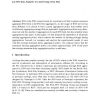WWW
2008
ACM
15 years 1 months ago
2008
ACM
Folksonomies have shown interesting potential for improving information discovery and exploration. Recent folksonomy systems investigate on the use of tag assignments, which combi...
WWW
2008
ACM
15 years 1 months ago
2008
ACM
RSS is the XML-based format for syndication of Web contents and users aggregate RSS feeds with RSS feed aggregators. As the usage of RSS service has been diffused, it is crucial to...
WWW
2008
ACM
15 years 1 months ago
2008
ACM
Web 2.0 marks a new philosophy where user is the main actor and content producer: users write blogs and comments, they tag, link, and upload photos, pictures, videos, and podcasts...
WWW
2008
ACM
15 years 1 months ago
2008
ACM
Recommendation systems which aim at providing relevant information to users are becoming more and more important and desirable due to the enormous amount of information available ...
WWW
2008
ACM
15 years 1 months ago
2008
ACM
Nowadays the Web represents a growing collection of an enormous amount of contents where the need for better ways to find and organize the available data is becoming a fundamental...
WWW
2008
ACM
15 years 1 months ago
2008
ACM
WWW
2008
ACM
15 years 1 months ago
2008
ACM
The rising popularity of Web 2.0, such as blogs, forums, online calendars/diaries, etc., makes users more interested in keeping their data on the Web. Sharing of such data could m...
WWW
2008
ACM
15 years 1 months ago
2008
ACM
Information sharing can be effective with structured data. The Semantic Web is mainly aimed at structuring information by creating widely accepted ontologies. However, users have ...
WWW
2008
ACM
15 years 1 months ago
2008
ACM
The concept of location has become very popular in many applications on the Web, in particular for those which aim at connecting the real world with resources on the Web. However,...
WWW
2008
ACM
15 years 1 months ago
2008
ACM
In this paper we examine 1) the scope of geo-ontologies used especially for the purposes of information retrieval on the Web, 2) the core geographical concepts and their mutual re...

